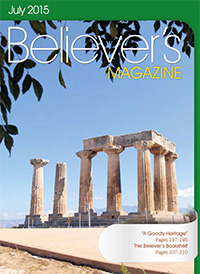The book of the prophet Jeremiah is the longest prophetic book in the Bible. The group known as the "Minor Prophets" is about 30% shorter. Jeremiah was born into a priestly family and was called of God to be a prophet. His call is recorded in the opening words of the book (1.4-19). There were also prophets who were contemporaries of Jeremiah: Zephaniah, Ezekiel, Daniel, Habakkuk, Nahum, and Huldah. The days in which these prophets lived were years when Israel was in a sorry spiritual condition. The situation of the nation was low, demanding that these godly servants proclaimed definitively what the Lord had to declare.
The call of Jeremiah was clearly set out by the Lord: "I formed thee" - created by God; "I knew thee" - known by God; "I sanctified thee" - set apart by God; "I ordained (gave) thee a prophet unto the nations" - gifted by God (1.5). The response of Jeremiah was that he was too young to serve. Doubtless he remembered Moses, as he also felt inadequate, being reluctant to serve the Lord. The example of Jonah may have come to mind as he felt the task distasteful, and himself not suitable.
What the Lord said was clear in setting out: His purpose - "I shall send thee"; His presence - "I am with thee"; His preparation - "I have put my words in thy mouth"; His power - "I have this day set thee over the nations and the kingdoms" (1.7-10).
Note that the Lord spoke further before Jeremiah: "Then said the Lord unto me" and, "the Lord said unto me" (1.12,14). The Lord now commanded: "gird up thy loins" - preparation for service; "and arise" - displaying determination; "and speak unto them" - bringing about implementation (1.17). How encouraging were the words of the Lord: "I am with thee" (1.19). Note again that Jeremiah was a young man when the Lord spoke to him. It has been considered by many that he was about 15-20 years of age.
So we learn that the Lord can speak to young believers and to those who seek early in life to determine their days of commitment to the Lord. But you may ask, "Are there other examples of those who were young in the service of the Lord Jesus?". Indeed there are. Timothy was a young servant of the Lord, and having watched him run well Paul tells him to "continue…in the things which thou hast learned". He was to do so with confidence because "All scripture is given by inspiration of God, and is profitable…" (2 Tim 3.14,16), "that the man of God be perfect" (2 Tim 3.17), completely equipped. Timothy was mentioned by Paul as "my workfellow", together with Lucias, Jason, and Sosipater (Rom 16.21). Aquila and his wife Priscilla were also strong in their testimony (1 Cor 16.19), and who can read the writings of Paul without considering the lists of the men and women whose names are seen in Scripture.
The challenge today, which is very clear in society, is for young believers to read, testify, pray and cast themselves upon the Lord. The two examples, Jeremiah and Timothy, both leave the challenge of those who were young. The reading of the Word of God is vital. How often is it read? Listening to others is also necessary, but reading the Scriptures for ourselves must never be neglected.
The culture of today is increasingly claiming that the Word of God is unnecessary - a book that is out of time, out of value, and out of understanding. The challenge is not merely for an elderly group, it is a challenge for all. Young believers must read the Word of God, listen, and practise being a Christian. Too much time spent with modern technologies must not be allowed to waste the hours at our disposal.
The issue is, "How do the young deal with the society of today?". The young cannot progress by leaving the work alone to those who are older, and the older cannot leave it to the young. There must be agreement together. This challenge is declared to the young: put the Lord first. Make the full measure of your service, or as Paul writes to Timothy, "make full proof of thy ministry" (2 Tim 4.5).
Two young men who served God - Jeremiah and Timothy - and who lived generations apart, commenced their service when young. They lived in different circumstances, and yet from both there are lessons that are still powerful for today. We ought to follow their example.









